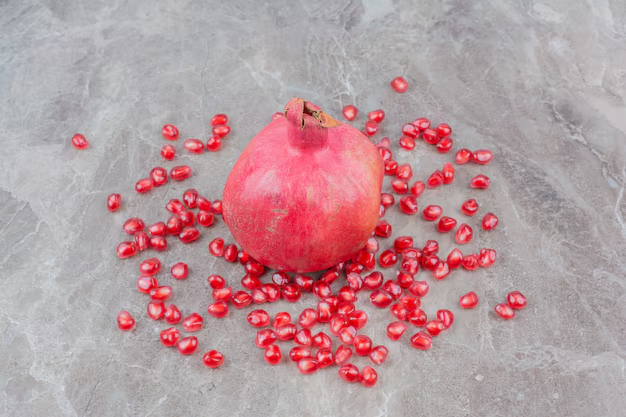Pomegranates are vibrant, nutrient-packed fruits cherished for their rich taste and numerous health benefits. Originating in ancient Persia, this ruby-red fruit has long been regarded as a symbol of health and vitality. But are pomegranates healthy? This article explores their nutritional profile and highlights the many ways they support overall health. Whether you’re a health enthusiast or just curious, let’s dive into why pomegranates deserve a spot in your diet.
Nutritional Profile of Pomegranates
Pomegranates are a nutritional powerhouse. They offer a unique combination of vitamins, minerals, and antioxidants that promote health and well-being.
Vitamins and Minerals
Pomegranates are loaded with essential nutrients. They are an excellent source of vitamin C, which supports immunity and collagen production. Vitamin K aids blood clotting and bone health, while folate is crucial for cell repair and growth. Potassium in pomegranates helps maintain healthy blood pressure.
Macronutrient Composition
Despite their sweetness, pomegranates are surprisingly low in calories and fat. A single cup of seeds contains around 140 calories, making it a guilt-free snack. They are also rich in dietary fiber, which aids digestion and keeps you feeling full longer.
Antioxidant Content
Pomegranates are packed with antioxidants like polyphenols, including flavonoids, tannins, and anthocyanins. These compounds combat oxidative stress and neutralize harmful free radicals, reducing the risk of chronic diseases.
Related to Read: Tart Pomegranate Frozen Yogurt
Health Benefits of Pomegranate
Pomegranates are not just visually appealing; they are also packed with nutrients and antioxidants that offer a multitude of health benefits. From supporting heart health to enhancing skin glow, this vibrant fruit has been celebrated for its medicinal properties for centuries. Let’s explore the incredible health benefits of pomegranates and why you should consider including them in your diet.

1. Rich in Antioxidants
Pomegranates are loaded with powerful antioxidants such as polyphenols, flavonoids, and tannins. These compounds help fight free radicals, reducing oxidative stress and preventing cell damage. The antioxidants in pomegranates are believed to be three times more potent than those in green tea.
2. Supports Heart Health
Pomegranates are excellent for your heart. They may help lower bad cholesterol (LDL) levels and increase good cholesterol (HDL). The fruit’s polyphenols also promote healthy blood vessels and prevent plaque buildup in arteries, reducing the risk of atherosclerosis. Studies suggest that regular consumption of pomegranate juice can help lower blood pressure, further supporting cardiovascular health.
3. Anti-Inflammatory Properties
Chronic inflammation is a contributing factor to many diseases, including arthritis and diabetes. Pomegranates contain bioactive compounds that combat inflammation in the body. These compounds work by suppressing inflammatory markers and enzymes, providing relief for those with conditions like rheumatoid arthritis.
4. Improves Digestive Health
High in dietary fiber, pomegranates are great for digestion. Fiber supports regular bowel movements, prevents constipation, and nourishes beneficial gut bacteria. Drinking pomegranate juice or eating the seeds can keep your digestive system functioning smoothly.
5. Boosts Immunity
Rich in vitamin C and other immune-boosting nutrients, pomegranates can help strengthen your body’s defenses against infections. Vitamin C promotes the production of white blood cells, which are essential for fighting off harmful pathogens.
6. Enhances Skin Health
Pomegranates are a natural boon for the skin. The antioxidants in the fruit help combat damage from UV rays and environmental pollutants, reducing signs of aging like wrinkles and fine lines. Pomegranate extracts can also promote skin elasticity and hydration.
7. Supports Brain Health
Research suggests that pomegranates may help protect brain health. Their antioxidants can reduce inflammation and oxidative stress in the brain, which are linked to neurodegenerative diseases like Alzheimer’s and Parkinson’s. Drinking pomegranate juice has been associated with improved memory and cognitive function.
8. Aids in Weight Management
Pomegranates are low in calories and rich in fiber, making them a perfect snack for those looking to manage their weight. The fiber content helps you feel full longer, reducing unnecessary cravings and overeating.
9. Promotes Exercise Endurance
Pomegranates contain nitrates, which improve blood flow and oxygen delivery to muscles during physical activity. This can enhance exercise performance, reduce fatigue, and aid recovery after workouts.
10. May Help Prevent Cancer
The antioxidants in pomegranates have shown potential in reducing the risk of certain cancers, such as breast, prostate, and colon cancer. They work by slowing the growth of cancer cells and promoting apoptosis (cell death) in harmful cells.
Related to Read: Pomegranate-Glazed Roasted Root Vegetables
Pomegranate Seeds: Edible and Nutritious
Pomegranate seeds are more than just a colorful addition to your plate—they’re packed with nutrients and health benefits. These tiny jewels are edible, versatile, and contribute significantly to overall health. From their safety and nutrient profile to creative ways to include them in your diet, let’s explore everything you need to know about pomegranate seeds.

Safety of Consumption
Pomegranate seeds, also known as arils, are entirely safe to eat. These juicy seeds are enclosed in a hard shell, but the edible part is the sweet, tangy arils.
Safe and Beneficial
Eating pomegranate seeds is both safe and nutritious for most people. They are not only flavorful but also easy to incorporate into various dishes. The fiber-rich seeds can aid digestion and promote gut health, making them a great addition to your diet.
Nutrient Density
Pomegranate seeds are small but mighty when it comes to nutrients. They are an excellent source of fiber, vitamin C, vitamin K, and antioxidants like polyphenols. These compounds play a vital role in reducing oxidative stress, supporting the immune system, and improving overall health.
Incorporating Pomegranates into Your Diet
Pomegranate seeds are versatile and can enhance the taste and nutritional value of your meals. Here’s how to choose, store, and prepare them effectively.
Selecting and Storing Pomegranates
To enjoy the freshest pomegranate seeds, select fruits that are heavy for their size with a vibrant, unblemished skin. Store whole pomegranates in a cool, dry place or refrigerate them for extended freshness. Once deseeded, the arils can be refrigerated for up to a week or frozen for longer storage.
Preparation Methods
Deseeding a pomegranate may seem daunting, but it’s simple with the right technique. Slice the fruit in half, hold it over a bowl, and tap the back with a spoon to release the seeds. For juicing, blend the seeds and strain the mixture to separate the juice from the pulp.
Recipe Ideas
Pomegranate seeds are incredibly versatile. Sprinkle them over salads for a burst of color and flavor. Add them to yogurt, smoothies, or oatmeal for a nutritious breakfast. They also pair beautifully with desserts like chocolate or ice cream and can be used as a garnish for savory dishes like roasted vegetables or grilled meats.
Potential Side Effects and Considerations
While pomegranate seeds are generally safe, it’s essential to be aware of potential side effects and limitations.
Allergies
Although rare, some individuals may experience allergic reactions to pomegranates. Symptoms can include itching, swelling, or difficulty breathing. If you suspect an allergy, discontinue use and consult a healthcare professional.
Interactions with Medications
Pomegranates may interact with certain medications, such as blood thinners or medications for high blood pressure. If you’re on any prescribed drugs, it’s best to consult your doctor before consuming large quantities.
Sugar Content
Pomegranates contain natural sugars, so individuals with diabetes should consume them in moderation. Pairing pomegranate seeds with fiber-rich or protein-packed foods can help balance blood sugar levels.
Conclusion
Pomegranate seeds are a delightful and nutritious addition to any diet. Packed with fiber, vitamins, and antioxidants, they offer numerous health benefits, from supporting digestion to improving heart health. By incorporating them into your meals, you can enjoy both their taste and their nutritional advantages. Whether you eat them fresh, juice them, or use them in recipes, pomegranates are a superfood worth celebrating. Add them to your grocery list today and reap the rewards of their health-boosting properties.
FAQs
1. Are pomegranate seeds safe to eat for everyone?
Yes, pomegranate seeds are safe for most people. However, individuals with specific allergies or sensitivities should exercise caution and consult a healthcare provider if they experience any adverse reactions.
2. Can I eat pomegranate seeds daily?
Absolutely! Eating pomegranate seeds daily is a great way to get essential nutrients like fiber, vitamin C, and antioxidants. Moderation is key, especially for people with dietary restrictions.
3. How do I store leftover pomegranate seeds?
Store pomegranate seeds in an airtight container in the refrigerator for up to a week. For long-term storage, freeze the seeds in a sealed bag for up to six months.
4. Is pomegranate juice as healthy as eating the seeds?
Pomegranate juice retains many of the fruit’s antioxidants but lacks the dietary fiber found in the seeds. Eating the seeds provides more comprehensive health benefits.
5. Can pomegranate seeds help with weight loss?
Yes, pomegranate seeds can support weight loss. Their fiber content promotes satiety, helping you feel full longer, and their low-calorie profile makes them a healthy snack option.

